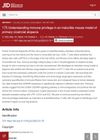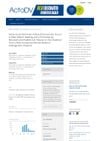25 citations,
June 2017 in “Journal of steroid biochemistry and molecular biology/The Journal of steroid biochemistry and molecular biology” VDR regulation varies by tissue and is crucial for its biological functions.
 90 citations,
October 1996 in “Dermatologic Clinics”
90 citations,
October 1996 in “Dermatologic Clinics” Growth factors are crucial for hair development and could help treat hair diseases.
April 2019 in “Journal of Investigative Dermatology” The humanized AA mouse model is better for testing new alopecia areata treatments.
2 citations,
May 2023 in “Biology” New mouse models of Pemphigus show severe symptoms and need better treatments.
January 2023 in “Pharmaceutics” AA–TF#15 significantly promotes hair regrowth and could be an effective treatment for androgenic alopecia.
 42 citations,
March 2010 in “Endocrinology”
42 citations,
March 2010 in “Endocrinology” Mice with human gene experienced hair loss when treated with DHT.
 1 citations,
April 2024 in “Journal of Pharmaceutical and Pharmacological Sciences”
1 citations,
April 2024 in “Journal of Pharmaceutical and Pharmacological Sciences” The mouse models are effective for testing new hair loss treatments.
 April 2023 in “The journal of investigative dermatology/Journal of investigative dermatology”
April 2023 in “The journal of investigative dermatology/Journal of investigative dermatology” The study found that a key immune pathway protecting hair follicles is reduced in a mouse model of scarring hair loss.
 October 2023 in “Acta dermato-venereologica”
October 2023 in “Acta dermato-venereologica” Minoxidil and platelet-rich plasma can help turn thin hair into thicker hair in male pattern baldness.
 5 citations,
February 2011 in “Expert Opinion on Drug Discovery”
5 citations,
February 2011 in “Expert Opinion on Drug Discovery” We need better treatments for hair loss, and while test-tube methods are helpful, they can't fully replace animal tests for evaluating new hair growth treatments.
 3 citations,
April 2010 in “Endocrinology”
3 citations,
April 2010 in “Endocrinology” The mouse model suggests male pattern baldness may be due to an enzyme increasing DHT and higher androgen receptor levels in hair follicles.
December 2007 in “한국미용학회지” The complex oriental medicine extract was as effective as minoxidil for hair regrowth in mice without adverse effects.
 1 citations,
September 2022 in “Journal of the American Academy of Dermatology”
1 citations,
September 2022 in “Journal of the American Academy of Dermatology” Exosome therapy shows promise for hair growth but needs human trials for validation.
1 citations,
September 2019 in “Journal of Investigative Dermatology” Anti-Desmocollin 3 antibodies can cause pemphigus-like symptoms in mice.
 October 2018 in “InTech eBooks”
October 2018 in “InTech eBooks” The gene Foxn1 is important for hair growth, and understanding it may lead to new alopecia treatments.
 20 citations,
December 2019 in “The journal of allergy and clinical immunology/Journal of allergy and clinical immunology/The journal of allergy and clinical immunology”
20 citations,
December 2019 in “The journal of allergy and clinical immunology/Journal of allergy and clinical immunology/The journal of allergy and clinical immunology” Blocking IL-12/IL-23 does not help with hair loss in alopecia areata for mice or humans.
 290 citations,
December 2017 in “Journal of The American Academy of Dermatology”
290 citations,
December 2017 in “Journal of The American Academy of Dermatology” Alopecia areata is an autoimmune condition causing hair loss, influenced by genetics, stress, and diet, and may be prevented by a high soy oil diet.
29 citations,
November 2011 in “Cell stress & chaperones” Quercetin effectively treated and prevented hair loss in mice.
 3 citations,
May 2018 in “InTech eBooks”
3 citations,
May 2018 in “InTech eBooks” Animal models, especially mice, are essential for advancing hair loss research and treatment.
 November 2023 in “The journal of investigative dermatology/Journal of investigative dermatology”
November 2023 in “The journal of investigative dermatology/Journal of investigative dermatology” The study developed a mouse model for Alopecia Areata that responds to treatment, useful for future research.
 35 citations,
August 2010 in “The American journal of pathology”
35 citations,
August 2010 in “The American journal of pathology” Researchers created a new mouse model for studying Citrullinemia Type I and similar conditions, showing symptoms and treatment responses like those in humans.
 7 citations,
January 2013 in “The journal of investigative dermatology/Journal of investigative dermatology”
7 citations,
January 2013 in “The journal of investigative dermatology/Journal of investigative dermatology” T-cell reconstitution after thymus transplantation can cause hair whitening and loss.
 30 citations,
August 2016 in “Advances in radiation oncology”
30 citations,
August 2016 in “Advances in radiation oncology” Researchers developed a mouse model that successfully mimics the bladder damage seen in humans after radiation therapy.
 2 citations,
April 2024 in “Advanced Materials”
2 citations,
April 2024 in “Advanced Materials” A microneedle patch can help regrow hair by restoring immune balance in hair follicles.
37 citations,
June 2000 in “Experimental dermatology” The Lanceolate hair-J mutation in mice mimics human hair disorders like Netherton's syndrome.
2 citations,
May 2022 in “Stem cell research & therapy” Disrupted stem cell signals in hairpoor mice cause hair loss.
 5 citations,
June 2019 in “British Journal of Dermatology”
5 citations,
June 2019 in “British Journal of Dermatology” Tofacitinib was more effective than apremilast in treating hair loss in a mouse model of alopecia areata.
22 citations,
July 2016 in “Cellular and Molecular Life Sciences” Genetic changes in mice help understand skin and hair disorders, aiding treatment development for acne and hair loss.
 184 citations,
February 2015 in “EBioMedicine”
184 citations,
February 2015 in “EBioMedicine” A patient with Alopecia Areata had complete hair regrowth after using the drug baricitinib.
 1 citations,
April 2019 in “The journal of investigative dermatology/Journal of investigative dermatology”
1 citations,
April 2019 in “The journal of investigative dermatology/Journal of investigative dermatology” Melanocyte-associated antigens may play a key role in alopecia areata and could be targets for new treatments.



















